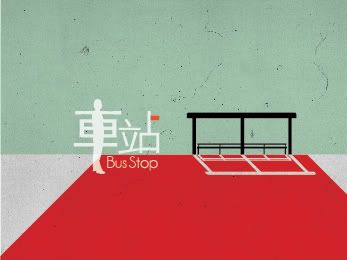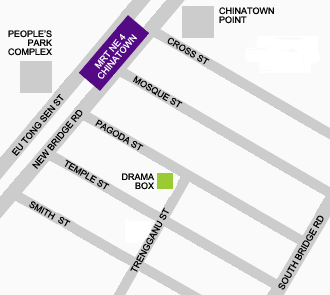2010年3月21日
第二堂课 Lesson 2 - Image Theatre
从我们动作的节奏感到……生活/生命的节奏
在这堂课的一开始,我们便玩了一些和节奏感有关的游戏,例如:chop chilli chop。这个游戏大家应该不会感到陌生吧。在进行了这些过冬之后,我发现艺树人的节奏感都不是太强。哈哈!这也许是因为我们会习惯一种特定节奏的关系吧!在活动进行了到一个时间点后,大家便习惯了那个节奏,一但出现乱调,大家便显得有点措手不及。
生活和生命也有节奏吗?
从这些和节奏感有关的活动可以联系到这一点。我们是否会因为惯于一些生活中的仪式而依照同样的节奏去进行着每一天的生活呢?
早上用同样的姿势下床…同样的速度刷牙…
庆亮和我们进行了一个和生活息息相关的活动-呈现我们生活中的仪式
大家围成一个圆圈,轮流呈现这些仪式。庆亮指示是:我们在坐这些动作时必须发出一个声音而且动作必须时可以不断重复的。
我们的发现…
在这个活动之后,大家开始讨论“仪式”的这个概念。从我们刚才呈现的仪式中,我发现几个特点。
1.这些生活的仪式使我们的生活有一种特定的规律。这些仪式也反映了我们的生活状态。
2.公共仪式 vs 个人的仪式
有些事情是大家每天都会做的,例如:刷牙,洗脸,有一些事情则是只有你自己会去进行。但不管是公共还是私人的仪式,我们都会有一套自己对该仪式的理解和另外一套我们认为别人会对该仪式所拥有的理解。所以在进行活动的时候,我们会一种“刻板”的方式去演出一些仪式。例如:每个人刷牙的方式都是不一样的,但在表演的时候,我们会用一种特定的方式去演出“刷牙”的这个仪式。因为我们认为其他人理解和想像中“刷牙”的动作应该是这样的。
当然,其他艺树人也有很多的想法。在这里我就不一一叙述了。艺树人可以留言,发表意见!
在小组内表演一套仪式
后来庆亮便叫我们分成两组。每一个人必须呈现一个生活的仪式,最后将每一个组员的仪式串联起来形成一个表演。我们可以将仪式夸大,进行重复,将速度放快/放慢,赋予表演更多层次的意义。之前我们和婉婧学的“观点”(Viewpoints)便又派上用场了!
我们发现生活的仪式似乎总是乱中有序,会有一定的时间顺序,但最终却又会回归到一个原点。而且我们往往运用时间来为生活找到生活仪式的中心点。例如:我们可能会觉得今天过得很没有规律所以便告诉自己,明天重新开始。
庆亮也提到了一些宗教仪式来向我们解释仪式如何在看似混乱的情况下找到一种规律。
仪式如何回到原点,成为支撑生活的中心?你们有什么想法吗?
什么是压迫?
后来庆亮便设置了一个类似在地铁上的情景,让我们讨论了一个核心的问题:什么是压迫?
我将用图表来详细描述不同的情景。敬请留意!

2010年3月14日
第一堂课 Lesson 1 - Image Theatre
一开始,我们进行了几个活动算是帮忙暖身,让我们的感训练我们在视觉想像方面的能力。之后我们便开始进行一些和 image 有直接关系的活动。
视觉想像 主题:男人、女人、政府
我们可以从听到的声音去想像画面其实是非常有趣的联系。这似乎证明了我们对一些概念建构了既定的印象。有时候这些刻板印象搞得我们啼笑皆非,但好笑的不是那个形态而是我们想像的方式。
在麻将纸上画画
- 想一个和不公正有关的故事。然后画一个和故事有关的一个图像。
通过声音做联系
- 现在想一个能够代表你的故事的声音。
- 闭上眼睛在空间走动并发出那个声音。
- 仔细地聆听,通过大家发出地声音去寻找和你有类似或相同经验的人并和他们形成小组然后在小组内分享你们的故事。
在15分钟内创作一个反模范 Creating an anti-model in 15 minutes
- 从分享的故事当中,选择其中一个故事并由故事创作一个反模范
- 想想这些问题:
(1)什么是压迫?
(2)什么是可被介入/可行的论坛剧场?
(3)什么是论坛剧场?
在呈现了个别的反模范之后,我们进行了一些讨论:
- 什么是权利?什么是权力?
我们需要为自己争取权利吗?又或者这应该是与生俱来,我们本来就应该有的?在怎样的情况下,我们会失去这些权力?是法律、政府还是我们的生长环境会决定权利的支配?
- 什么是empowerment?
试着想想这个情况:
老板压迫他的员工。后来他的员工联合起来“对付他”,那我们可以说这个老板现在被他的员工压迫吗?
我想大家现在都没有一个确定或是所谓的正确答案,毕竟我们也才刚刚开始学习。但我们会在训练的过程中不断地提醒自己有关于这些问题。希望在上完所有的课以后,我们能找到自己的答案。
Visualizing image
Theme: Man, woman, government
The fact that we visualize an image with the sound that is let out shows how we construct the concept of gender or simply the way to understand the other gender. The stereotypical images produced can be really hilarious, not in the way the image is done but we have imagined certain things.
Drawing something on the mahjong paper
Think of a story with regards to injustice, draw an image of the story on the mahjong paper, then connect the different images.
Making connections through sounds
- Think of a sound that can represent your story then move around in the space while making that sound with your eyes closed.
- By listening to the different sounds, look out for sounds, which you think, represent similar stories or experience as you. Form a group with them and share the story. Choose one of the stories and create an anti-model from there.
- Keep these questions in mind
(1) What is oppression?
(2) What can be intervened?
What are rights? What is power?
Do we need to fight for our rights? Or it should be something that we are entitled to from the moment we are born? Under what circumstances are the rights “taken away” from us? Law? Government? Our living environment as a whole?
- What is empowerment?
- Think about this scenario:
- A boss oppressed his employees. When all his employees “gang up” and turn against him/ ostracized him, can we say that the boss is now oppressed by his employees?
- I guess all ARTivators do not have the perfect and correct answers to these questions now that we are only at the very beginning of the lessons. BUT, we will be keeping these questions in mind throughout our training process. Hopefully, at the end of the lessons, we will be able to figure out something for ourselves. You can keep these questions in mind too!

许慧铃 Koh Hui Ling
艺术总监 Artistic Director
 母性泛滥; 热爱人
母性泛滥; 热爱人
着重于戏剧/剧场的应用与教学法
Overpowering maternal instincts
Loves Human(ity)
Aims at developing the use of applied drama / theatre
梁海彬 Neo Hai Bin
 长着翅膀
长着翅膀
在剧场里翱翔...
一个
鸟人。
The world's a stage...
I'm in the latecomer's queue.
刘佳宜 Liew Jiayi
 我在南大念心理学科。心理学对我来说,跟戏剧的妙处不相上下。
我在南大念心理学科。心理学对我来说,跟戏剧的妙处不相上下。
越做,越发现,我懂得不多。越不懂,就越想发现,越想继续做 (:
I am currently an undergrad in NTU. My major is psychology and the most common question asked when I reveal that fact is whether I can read his/her mind. Honestly, I cannot lah. Currently, I am daydreaming about my future hoping to achieve 2 things i enjoy alot in life: Theatre and Psychology (:
林丹凤 Lam Dan Fong
 就读南洋理工大学。
就读南洋理工大学。
习惯催眠自己就读的科目与艺术(剧场)有关。还在探索当中。
2012年5月毕业后,领悟到了答案再跟大家分享。
Studying Accountancy in NTU and living a second life in theatre, where (fortunately) the former will end in 2012 May. Believes that there is a connection between numbers and the arts, or maybe, I am just living in denial all the time.
林慧萍 Lim Hwee Peng
 法律系学生。
法律系学生。
正在面临"刻年"危机。
志愿当长发公主。
Law student.
Currently experiencing "quarter-life" crisis.
Aspiring Rapunzel.
张英豪 Teo Eng Hao
 正值后青春期的门槛状态。
正值后青春期的门槛状态。
剧场爱好者,正在学习做个剧场人。
热血梦想:征服全世界,或,不被世界驯服。
励志宣言:剧场就是Play! 让我们一起玩转地球!
A post-graduate student from NTU Division of Chinese.
韩雪梅 Han Xuemei
 热爱的东西太多,拥有的时间有限。
热爱的东西太多,拥有的时间有限。
记性日渐退化,一年比一年老。
Carries an overwhelming amount of passion for an overwhelming number of things, coping with the limited amount of time.
Struggling against a degenerating capacity to remember, and aging year by year.
Like anybody else.
王放 Kate
 在国大读书.
在国大读书.
写这个东西简直比写任何论文还难!
An undergrad at NUS.
Coming out with this line is harder than any paper I've ever written.
谢秀彬 Entia Seah Siew Ping
 南大中文系毕业。非常健忘,经常丢三落四。
南大中文系毕业。非常健忘,经常丢三落四。
热爱教育,喜欢和人接触。
Some people say that I look like an ah-lian when I’m quiet and sounds like an auntie when I speak.
I embrace all these comments and aspire to be an elegant ah-lian and intelligent auntie!
何健僮 Ho Jian Tong
 在2009年毕业于新加坡国立大学的科学系。由于我目前还在学习编剧和导戏的工作,未能有值得一提的代表作。
在2009年毕业于新加坡国立大学的科学系。由于我目前还在学习编剧和导戏的工作,未能有值得一提的代表作。
Graduated from “The Brainforest of Clementi” with an Honours degree in Life Sciences. As I am currently learning to write and direct plays properly, I do not have any work that is worthy of mention as yet.
骆丽诗 Myra Loke
 爱与剧场牵手,与社会学接吻。
爱与剧场牵手,与社会学接吻。
Sometimes we need to be crazy, to be human.
陈玮婷 Tan Wei Ting
 艺树人面试那一天,我告诉许慧铃:"其实我想要做的是电影。"
艺树人面试那一天,我告诉许慧铃:"其实我想要做的是电影。"
南大电影系上课头一天,我告诉教授:"其实我要做的是剧场。"
三年的时间找一找自己,也够了。
I started doing Theatre thinking that I want to do Film.
Now I'm studying Film determined to do Theatre.
Funny yea?
2010年3月21日
第二堂课 Lesson 2 - Image Theatre
从我们动作的节奏感到……生活/生命的节奏
在这堂课的一开始,我们便玩了一些和节奏感有关的游戏,例如:chop chilli chop。这个游戏大家应该不会感到陌生吧。在进行了这些过冬之后,我发现艺树人的节奏感都不是太强。哈哈!这也许是因为我们会习惯一种特定节奏的关系吧!在活动进行了到一个时间点后,大家便习惯了那个节奏,一但出现乱调,大家便显得有点措手不及。
生活和生命也有节奏吗?
从这些和节奏感有关的活动可以联系到这一点。我们是否会因为惯于一些生活中的仪式而依照同样的节奏去进行着每一天的生活呢?
早上用同样的姿势下床…同样的速度刷牙…
庆亮和我们进行了一个和生活息息相关的活动-呈现我们生活中的仪式
大家围成一个圆圈,轮流呈现这些仪式。庆亮指示是:我们在坐这些动作时必须发出一个声音而且动作必须时可以不断重复的。
我们的发现…
在这个活动之后,大家开始讨论“仪式”的这个概念。从我们刚才呈现的仪式中,我发现几个特点。
1.这些生活的仪式使我们的生活有一种特定的规律。这些仪式也反映了我们的生活状态。
2.公共仪式 vs 个人的仪式
有些事情是大家每天都会做的,例如:刷牙,洗脸,有一些事情则是只有你自己会去进行。但不管是公共还是私人的仪式,我们都会有一套自己对该仪式的理解和另外一套我们认为别人会对该仪式所拥有的理解。所以在进行活动的时候,我们会一种“刻板”的方式去演出一些仪式。例如:每个人刷牙的方式都是不一样的,但在表演的时候,我们会用一种特定的方式去演出“刷牙”的这个仪式。因为我们认为其他人理解和想像中“刷牙”的动作应该是这样的。
当然,其他艺树人也有很多的想法。在这里我就不一一叙述了。艺树人可以留言,发表意见!
在小组内表演一套仪式
后来庆亮便叫我们分成两组。每一个人必须呈现一个生活的仪式,最后将每一个组员的仪式串联起来形成一个表演。我们可以将仪式夸大,进行重复,将速度放快/放慢,赋予表演更多层次的意义。之前我们和婉婧学的“观点”(Viewpoints)便又派上用场了!
我们发现生活的仪式似乎总是乱中有序,会有一定的时间顺序,但最终却又会回归到一个原点。而且我们往往运用时间来为生活找到生活仪式的中心点。例如:我们可能会觉得今天过得很没有规律所以便告诉自己,明天重新开始。
庆亮也提到了一些宗教仪式来向我们解释仪式如何在看似混乱的情况下找到一种规律。
仪式如何回到原点,成为支撑生活的中心?你们有什么想法吗?
什么是压迫?
后来庆亮便设置了一个类似在地铁上的情景,让我们讨论了一个核心的问题:什么是压迫?
我将用图表来详细描述不同的情景。敬请留意!

2010年3月14日
第一堂课 Lesson 1 - Image Theatre
一开始,我们进行了几个活动算是帮忙暖身,让我们的感训练我们在视觉想像方面的能力。之后我们便开始进行一些和 image 有直接关系的活动。
视觉想像 主题:男人、女人、政府
我们可以从听到的声音去想像画面其实是非常有趣的联系。这似乎证明了我们对一些概念建构了既定的印象。有时候这些刻板印象搞得我们啼笑皆非,但好笑的不是那个形态而是我们想像的方式。
在麻将纸上画画
- 想一个和不公正有关的故事。然后画一个和故事有关的一个图像。
通过声音做联系
- 现在想一个能够代表你的故事的声音。
- 闭上眼睛在空间走动并发出那个声音。
- 仔细地聆听,通过大家发出地声音去寻找和你有类似或相同经验的人并和他们形成小组然后在小组内分享你们的故事。
在15分钟内创作一个反模范 Creating an anti-model in 15 minutes
- 从分享的故事当中,选择其中一个故事并由故事创作一个反模范
- 想想这些问题:
(1)什么是压迫?
(2)什么是可被介入/可行的论坛剧场?
(3)什么是论坛剧场?
在呈现了个别的反模范之后,我们进行了一些讨论:
- 什么是权利?什么是权力?
我们需要为自己争取权利吗?又或者这应该是与生俱来,我们本来就应该有的?在怎样的情况下,我们会失去这些权力?是法律、政府还是我们的生长环境会决定权利的支配?
- 什么是empowerment?
试着想想这个情况:
老板压迫他的员工。后来他的员工联合起来“对付他”,那我们可以说这个老板现在被他的员工压迫吗?
我想大家现在都没有一个确定或是所谓的正确答案,毕竟我们也才刚刚开始学习。但我们会在训练的过程中不断地提醒自己有关于这些问题。希望在上完所有的课以后,我们能找到自己的答案。
Visualizing image
Theme: Man, woman, government
The fact that we visualize an image with the sound that is let out shows how we construct the concept of gender or simply the way to understand the other gender. The stereotypical images produced can be really hilarious, not in the way the image is done but we have imagined certain things.
Drawing something on the mahjong paper
Think of a story with regards to injustice, draw an image of the story on the mahjong paper, then connect the different images.
Making connections through sounds
- Think of a sound that can represent your story then move around in the space while making that sound with your eyes closed.
- By listening to the different sounds, look out for sounds, which you think, represent similar stories or experience as you. Form a group with them and share the story. Choose one of the stories and create an anti-model from there.
- Keep these questions in mind
(1) What is oppression?
(2) What can be intervened?
What are rights? What is power?
Do we need to fight for our rights? Or it should be something that we are entitled to from the moment we are born? Under what circumstances are the rights “taken away” from us? Law? Government? Our living environment as a whole?
- What is empowerment?
- Think about this scenario:
- A boss oppressed his employees. When all his employees “gang up” and turn against him/ ostracized him, can we say that the boss is now oppressed by his employees?
- I guess all ARTivators do not have the perfect and correct answers to these questions now that we are only at the very beginning of the lessons. BUT, we will be keeping these questions in mind throughout our training process. Hopefully, at the end of the lessons, we will be able to figure out something for ourselves. You can keep these questions in mind too!

艺树人的过往镜头
_______________________________________________________________________
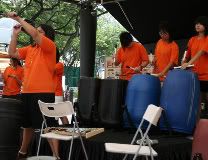
- The FLAMES利用环保乐器所带来的精彩表演
补天计划之《绿吗?》
2008年1月
《绿吗?》是戏剧盒08年以环保为主题的社区演出系列的一部分。
艺术人希望通过此活动,让公众,特别是青少年,对环境有更深的认识,并且更了解自己对环境造成的影响。
《父。女花》
编剧: 林丹凤
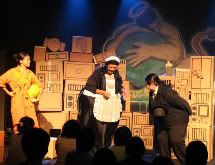
- 艺树人呈献的戏剧小品
创作灵感取自柯思仁《梦树观屋》中一句:
“砍倒一棵树,可以再种。对人类来说,这只是一件微不足道的事”。
剧中描述的是女儿面对父亲酗酒赌钱,因而要她把心爱的花卖掉的抉择。
《塑料杀死猫》
编剧: 何健僮
一个神秘女子为了名利而开始进行实验,培植一种智慧崇高的动物。因为要去远行休息,女子把实验品交给了她的管家照顾。
可是实验出现了无法想象的变化,因而对豪宅与人类的安全造成了威胁。
最终,为了把家中的大害除掉,她和管家与一手创造的动物大动干戈!

- 非一般的小型户外市集
协助编剧:郭庆亮
执导:许慧铃
返回页顶
_______________________________________________________________________
Project Mending Sky: THE GREEN MAN!
January 2008
The Green Man is part of Drama Box’s community project on Environment.
Conceptualized and organized by ARTivate, the event consists of:
- - ARTivate’s thought-provoking plays on environmental conservation
- - “The Flames” musical performance by girls from Andrew & Grace Home
- - A mini bazaar that promotes environmental conservation
Selfish, written by Lam Dan Fong, reveals a story about the decision of a daughter -
to escape into a perfect new world or remain in the world of self destruction.
Plasti-City Kills the Cat written by Ho Kian Tong, explores the harm brought about by plastics to the environment.
The plays are written under the dramaturgy of Kok Heng Leun and directed by Koh Hui Ling.
返回页顶
_______________________________________________________________________
What Matters?
July 2008

What Matters? is a package of one forum theatre play and three fringe activities which explores the issue of race with the youths of today.
Through the series of fringe activities and the Forum Theatre play, ARTivate aims to probe further into the awareness of racial issues with the youths of today and understand the true meaning of harmony between races.
Forum Theatre Play
3 students of different races set up an Adventure Club in school. As they prepare to go on a new adventure to search for fugitive Mas Selamat in their club room, an accident happened in the school and conflicts arose within the group.
*The play is performed mainly in English with some Mandarin and Malay
Fringe #1: Race in School – Stereotypes and Others
The youths were asked to move, play, think and discover, thus finding the way of dealing with racial issues in real life.
Fringe #2: Movie screening – To Kill a Mocking bird
Based on the novel by Harper Lee, this award-winning classic film present racial issues vividly on screen.
There was a discussion session after the screening facilitated by Mr. Danny Yeo.

- Sharing by young actors of Class Enemy from Bosnia
Fringe #3: Survival Ethnic Conflicts in Bosnia – a Singapore Arts Festival programme
Sharing by young actors of Class Enemy from Bosnia on their personal experiences of the war-torn times and how they have learnt to cope with growing up in an environment filled with violence caused by racial and ethnic conflicts.
Speaker: Director Haris Pasovic and the cast of CLASS ENEMY (East West Theatre Company)
返回页顶
_______________________________________________________________________
Project Mending Sky: Movie Screening
August 2008
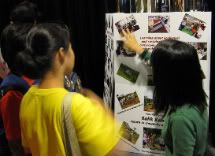
- Learning about the environment
The Movie Screening is the second installment of Project Mending Sky: The Green Man, held in conjunction with Project Mending Sky: ME (补天计划之我).
Through movie screenings and post-movie discussion sessions ARTivate hopes to explore issues surrounding our Earth’s survival amidst the damages we are inflicting on her.
Documentary-Movie #1: Winged Migration
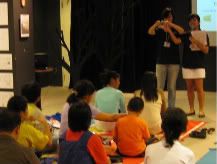
- Teaching the audience how to make dustbins using flyers
Directed by Jacques Perrin, a noted actor and film producer in France, this Academy Award nominated movie records the flight of dozens of different birds from around the globe as they follow their navigational instincts and make the taxing journey to more temperate climates in the fall.
Documentary -Movie #2: The Greening of Cuba
Cuban farmers and scientists working to reinvent a sustainable agriculture based on ecological principles and local knowledge rather than imported agricultural inputs which remind us that developed and developing nations alike can choose a healthier environment and still feed their people.

- The audience sharing
Documentary -Movie #3: The Power of Community
A follow-up to The Greening of Cuba 10 years later to see how the Cuban transitioned from a highly mechanized, industrial agricultural system to one using organic methods of farming and local, urban gardens.
Discussions facilitated by: Mr Danny Yeo and Mr Tay Lai Hock
*Language: English (with English subtitles)
返回页顶
_______________________________________________________________________
《 城S 》
2009年7月
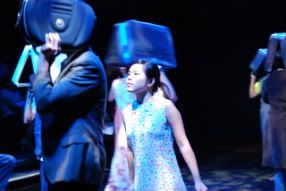
《城S》是艺树人首个以集体创作的方式完成的作品也是艺树人经过一年演员及编剧培训后的首个演出。在集体创作引导者郭庆亮和导演许婉婧的指导下,艺树人尝试了各种即兴表演,经过不断的试验剧本才达到了令人满意的成果。
《城S》以新加坡社会和现今高度融合及环球化的世界作为语境,对城市包容性的概念进行探索。
剧中的故事呈现城市的各个面向并由一系列的行李箱奏鸣曲所串连。行李箱奏鸣曲象征了一个旅程,让大家通过这个旅程反思多数人如何建构与看待社会中的意识形态。
在剧中,转制的体制,不和谐的状况,受歧视,被限制,被异化,被压抑等诸如此类的现实情况将被正视。多数人所作的决定能代表少数人的意见吗?在这场力争上游的竞赛中,精英又是否会考虑到一般老百姓的福利呢?你的言行举动是出自你的本意又或是受到其他人的影响?
艺树人希望观众能够通过观赏此剧重新思考真正具有包容性的城市所蕴含的意义再回答自己这些问题。
由艺树人集体创作和演出, 郭庆亮担任集体创作引导者, 许婉婧(戏剧盒艺术工作伙伴)导演.
*演出主要以中文进行。(提供英文字幕)
返回页顶
_______________________________________________________________________
CityS
July 2009
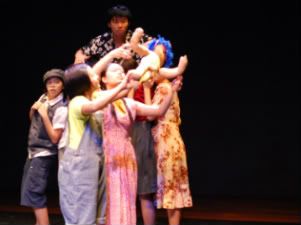 Part of a double-bill during
Part of a double-bill during
Singapore Drama Educators Association (SDEA) Celebrate Drama 2009
“CityS” is ARTivate’s first devised play. It is also ARTivate’s debut presentation following a year-round capacity-building process, during which the ARTivators underwent a series of training involving acting and playwrighting.
It is conceived and brought to satisfactory theatrical fruition by the collaboration of all ARTivators via a gradual process and accumulation of brainstorming and improvisation, under the guidance of devising facilitator Kok Heng Leun and director Koh Wan Ching.
“CityS” explores the concept of an inclusive city, in Singapore’s context, and in the context of our current highly integrated, globalised world.
In this play, stories from different aspects of a city are connected by a series of luggage sonatas which symbolizes a journey that questions the ideology constructed and perceived by majority of the society. Realities are confronted: autocracy, disharmony, discrimination, limitations, alienation, oppression and the likes. Does the decision of the majority always account for the minority? Will the elites ever consider the welfare of their downtown folks in this race to the top? Is that action you took out of free will or under the influence of others?
ARTivate hopes that audiences will reconsider the meaning of a truly inclusive city after watching the play and in turn, answer these questions for themselves.
Devised and performed by
ARTivateDevising facilitated by
Kok Heng Leun Directed by
Koh Wan Ching
*Performed mainly in Mandarin. (English Surtitles provided)
返回页顶
_______________________________________________________________________
《嘘… 审查:论坛剧场演出》
2010年9月

为了提高人们对审查制度的意识并让大家了解审查如何渗透生活,这个演出原本准备使用具象征性的舞台设计并进行现场音乐伴奏,冲破语言和种族的障碍让观众发现审查的力量。演出以5个小品组成,是艺树人经过5个月严密训练创作的结晶。
然而,距离演出仅剩三周的时候,新加坡媒体发展局告知我们户外表演执照不被批准。由于短剧探讨”敏感”课题,当局要求演出必须附上“含有成人议题”的说明并声称只有在室内演出,才能有效地执行说明。
因此,我们最后决定取消原本的演出,重新创作另一出论坛剧场来探讨在重要的课题上保持沉默,或刻意隐瞒实情所带来的诸多问题,而这些问题又如何导致沟通、对话上的断层。
导演:
郭庆亮, 与
艺树人联合创作
现场音乐:
光弧宫
返回页顶
_______________________________________________________________________
shh… censorship: a forum theatre performance
September 2010

This forum theatre performance is a wordless piece that comprises of 5 short pieces. Using a symbolic set design, and featuring live music accompaniment by ARCN TEMPL, this performance hope to transcend language and racial barriers, leading its viewers in discovering the power of censorship, with the aim of creating awareness in the communities about how censorship affects their daily lives.
However, just 3 weeks from our performance, MDA denied us of an outdoor performance license. The authorities gave an advisory for mature content due to the “sensitive nature” of the topics discussed, and claimed that we had to perform indoors in order to administer the advisory.
We stand by our position that the piece should be performed outdoors to reach as diverse a crowd as possible and believe that the issue of censorship should still be addressed. Therefore, we decided to withdraw the original piece from our programme, and replaced it with a new Forum Theatre performance, which discussed the problems of imposing silence and withholding information about important issues.
Devised and performed by ARTivate, this performance is the result of five months of training in Forum Theatre.
Comprising of five short pieces, imploring you to join us in discovering the power of censorship.
Directed by
Kok Heng Leun, co-created with
ARTivate
Live music by
ARCN TEMPL
返回页顶
_______________________________________________________________________
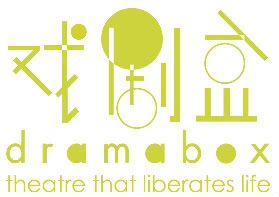
戏剧盒是新加坡最富代表性的现代华语剧团。它也是非盈利的慈善团体。成立于1990年,它凭着关怀社会的人文精神,对公民教育的积极态度,获得了广大观众的肯定。我们的演出除了富娱乐性和趣味性,也常常让观众深思并省思。
Drama Box is Singapore's most prominent contemporary Mandarin theatre company. It is a professional non-profit company with charity status. Formed in 1990, it has since gained a respectable reputation for its acute sensitivity and perception in heightening social awareness and civic responsibility. Our productions remain fun and entertaining, yet thought-provoking and reflective.
戏剧盒omy部落格告诉你戏剧盒的点点滴滴!
白色空间 之 编剧系列
继2001年演员训练工作室《白色空间》后,戏剧盒再度出发为本地中文戏剧界开拓新能量,推出为期18个月的剧本孵化室 --《白色空间之编剧系列》。通过新旧剧本创作者的定期沟通与互动,催生新一波原创剧本,捕捉属于我们时代的脉动。
Blanc Space
The Blanc Space was inaugurated in 2000 to provide a training platform for performers. In 2007, the company expanded Blanc Space to include programmes for budding directors and aspiring playwrights.


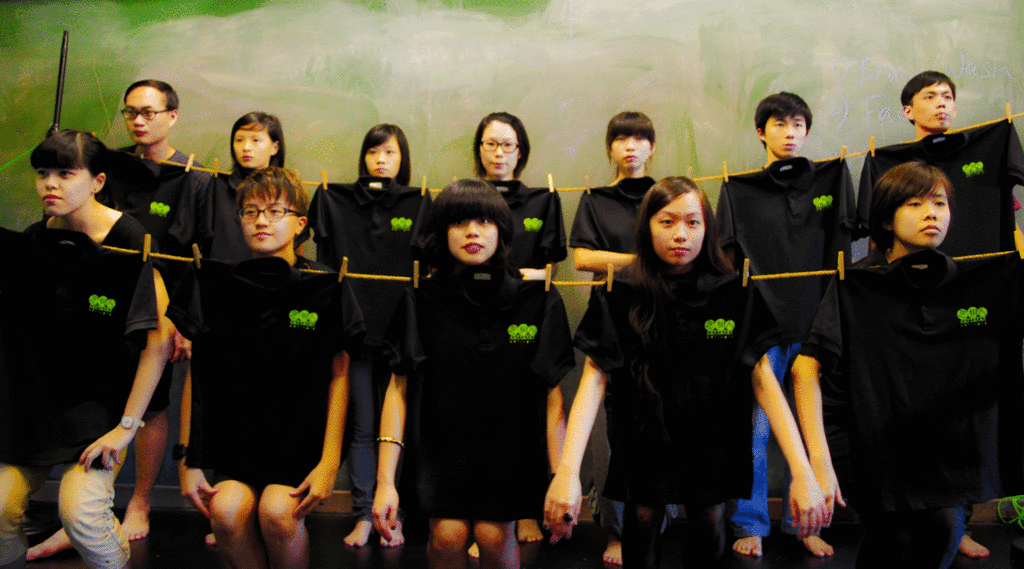
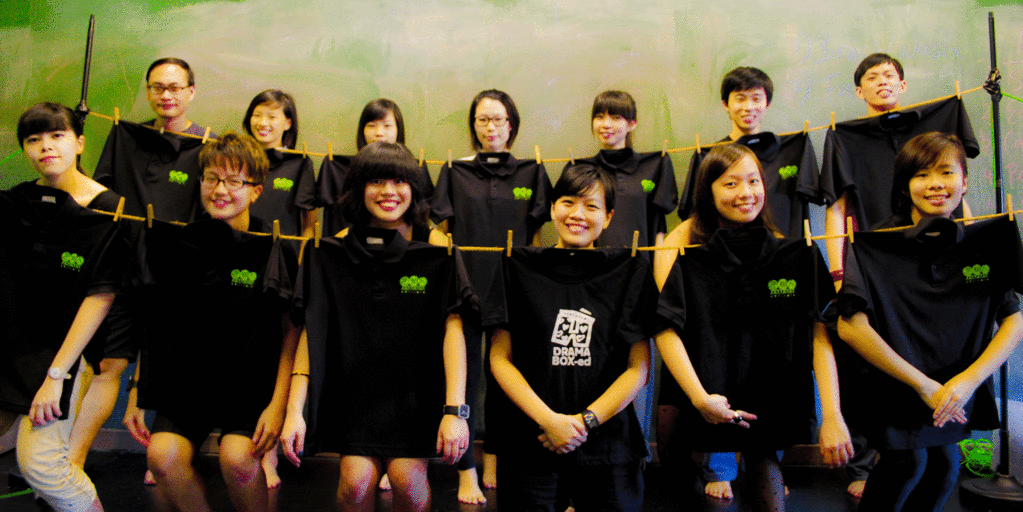
 母性泛滥; 热爱人
母性泛滥; 热爱人 长着翅膀
长着翅膀 我在南大念心理学科。心理学对我来说,跟戏剧的妙处不相上下。
我在南大念心理学科。心理学对我来说,跟戏剧的妙处不相上下。 就读南洋理工大学。
就读南洋理工大学。 法律系学生。
法律系学生。 正值后青春期的门槛状态。
正值后青春期的门槛状态。 热爱的东西太多,拥有的时间有限。
热爱的东西太多,拥有的时间有限。 在国大读书.
在国大读书. 南大中文系毕业。非常健忘,经常丢三落四。
南大中文系毕业。非常健忘,经常丢三落四。 在2009年毕业于新加坡国立大学的科学系。由于我目前还在学习编剧和导戏的工作,未能有值得一提的代表作。
在2009年毕业于新加坡国立大学的科学系。由于我目前还在学习编剧和导戏的工作,未能有值得一提的代表作。 爱与剧场牵手,与社会学接吻。
爱与剧场牵手,与社会学接吻。 艺树人面试那一天,我告诉许慧铃:"其实我想要做的是电影。"
艺树人面试那一天,我告诉许慧铃:"其实我想要做的是电影。" 









